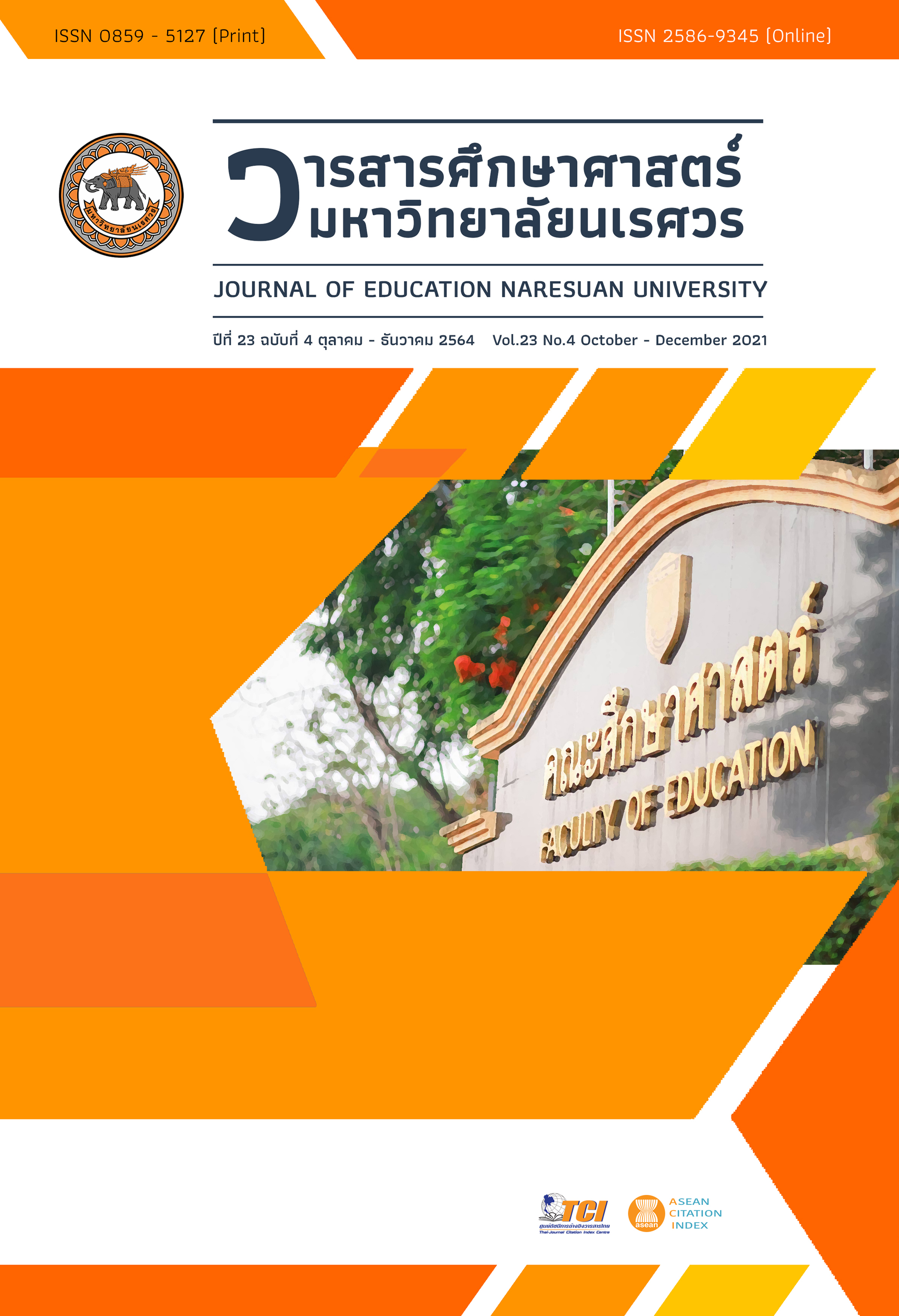DEVELOPING EFFICIENT WEBQUEST–BASED INSTRUCTION THROUGH ONLINE SOCIAL NETWORK FOR ENHANCING ANALYTICAL THINKING SKILL, EVALUATIVE THINKING, AND SELF-DIRECTED LEARNING BEHAVIOR OF TEACHER EDUCATION STUDENTS การพัฒนาบทเรียนแสวงรู้บนเว็บผ่านสื่อสังคมออนไลน์ที่มีประสิทธิภาพ เพื่อสร้างเสริมทักษะการคิดวิเคราะห์ การคิดเชิงประเมิน และพฤติกรรมการเรียนรู้แบบนำตนเองของนักศึกษาครู
Main Article Content
Abstract
The purposes of this study were to 1) develop the WebQuest–based instruction through online social network with a required efficiency according to Meguigans criterion, 2) to compare learning achievement, analytical thinking skill, evaluative thinking, and self-directed learning behavior of WebQuest instruction group students between pretest and posttest, 3) to compare learning achievement, analytical thinking skill, evaluative thinking, and self-directed learning behavior between WebQuest instruction group and traditional instruction group, and 4) to investigate students’ satisfaction toward WebQuest instruction. Samples consisted of two groups of bachelor in education program students, Bansomdejchaopraya Rajabhat University who registered for the course of data communication and computer network in school, obtained by random assignment into WebQuest instructional group and traditional instructional group, 30 of each. Both groups were assessed a pretest and posttest and studied in the same topics for 8 weeks. Instruments used in the study were WebQuest–based instruction through online social network, learning achievement test, analytical thinking skill test, questionnaires of evaluative thinking, self-directed learning behavior, and satisfaction toward the WebQuest instruction. The data were then analyzed using Mean, Standard Deviation, and t-test. The findings revealed that 1) the WebQuest–based instruction through online social network showed an efficiency ratio of 1.12, met the Meguigans criterion, 2) posttest mean scores of learning achievement, analytical thinking skill, evaluative thinking, and self-directed learning behavior of WebQuest instruction group were statistically significant higher than pretest mean scores, and 3) posttest mean scores of learning achievement, analytical thinking skill, evaluative thinking, and self-directed learning behavior of the WebQuest instruction group were statistically significant higher than the traditional instruction group, and 4) the overall satisfaction of students learning through the WebQuest lesson was found at a high level.
Article Details
The owner of the article does not copy or violate any of its copyright. If any copyright infringement occurs or prosecution, in any case, the Editorial Board is not involved in all the rights to the owner of the article to be performed.
References
Anderson, L. W., & Krathwohl, D. R. (2001). A taxonomy learning, teaching, and assessing: A revision of Bloom’s taxonomy of educational objectives. New York: Longman.
Bloom, B. S. (1956). Taxonomy of educational objectives, handbook I: The cognitive domain. New York: David McKay.
David, L. (2014). ARCS model of motivational design theories (Keller). [Web page]. https://www.learning-theories.com/kellers-arcs-model-of-motivational-design.html
Dodge, B. (1997). Some thoughts about WebQuests. Retrieved September 1, 2018, from https://manchester.rl.talis.com/items/D6B20038–38B3–454B–984D–6E622921F2EF.html
Insa-ard, S. (2016). A design of e-learning lesson to enhance advance thinking skill. Bangkok: SE-Education. [in Thai]
Khoochonthara, P. (2016). Role of e–Learning with Self–directed Learning. TUH Journal online, 1(1), 53–61. [in Thai]
Mahuema, K. (2016). WebQuest. Retrieved August 19, 2017, from https://beewebquest.blogspot.com/
Mitsikopoulou, B. (2018). English and digital literacies unit 6.1: Introduction to Webqusts. Greece: National and Kapodistrian, University of Athens.
Office of the Education Council (ONEC). (2010). Educational Reform Proposals in the Second Decade (B.E. 2552-2561). Bangkok: Office of Education Policy and Planning. [in Thai]
Pengtong, S., Wararatpanya, K., & Krootjohn, S. (2012). Development of an instruction model on PInS-WebQuest for enhancing thinking skill and self-directed learning. Journal of library and information science Srinakharinwirot University, 5(1), 82–93. [in Thai]
Polly, D., & Ausband, L. (1993). Developing higher order thinking skills through WebQuests. Journal of Computing in Teacher Education, 26(1), 29–34.
Prangsorn, S., & Patkachar, U. (2013). Learning with a WebQuest on higher order thinking skills. Executive Journal, 33(3), 82–93. [in Thai]
Prangsorn, S., Piriyasurawong, P., & Nilssok, P. (2014). Instructional model with WebQuest using problem-based toward problem solving ability and critical thinking. Technical Education Journal King Mongkut’s University of Technology North Bangkok, 5(2), 24–33. [in Thai]
Sikkhabandit, S. (1985). Educational technology. Bangkok: King Mongkut’s Institute of Technology North Bangkok. [in Thai]
Singkhajorn, S. (2014). Development of Learning and Teaching by Social Network. Electronic Journal of Open and Distance Innovative Learning, 4(2), 18-34. [in Thai]
Thammmetar, T. (2014). E-Learning: From theory to practice. Bangkok: Thailand Cyber University Project, Office of the Higher Education Commission. [in Thai]
Tuntavanitch, P. (2015). Taxonomy of educational objectives, cognitive domain based on the concept of Benjamin S. Bloom: Revision edition. Lampang Rajabhat University Journal, 3(2), 13–25. [in Thai]
University of Waterloo, Centre for Teaching Excellence. (2016). Self–directed learning: A four–step process. Retrieved July 20, 2018, from http://waterloo.ca/centrefor–teaching–excellence/teaching–tips/tip–students/self–directed–learning
Wangsrikoon, A. (2014). Thai education in the 21st century: Productivity and development guidelines. Humanities and Social Sciences Journal of Pibulsongkram Rajabhat University, 8(1), 1–17. [in Thai]


